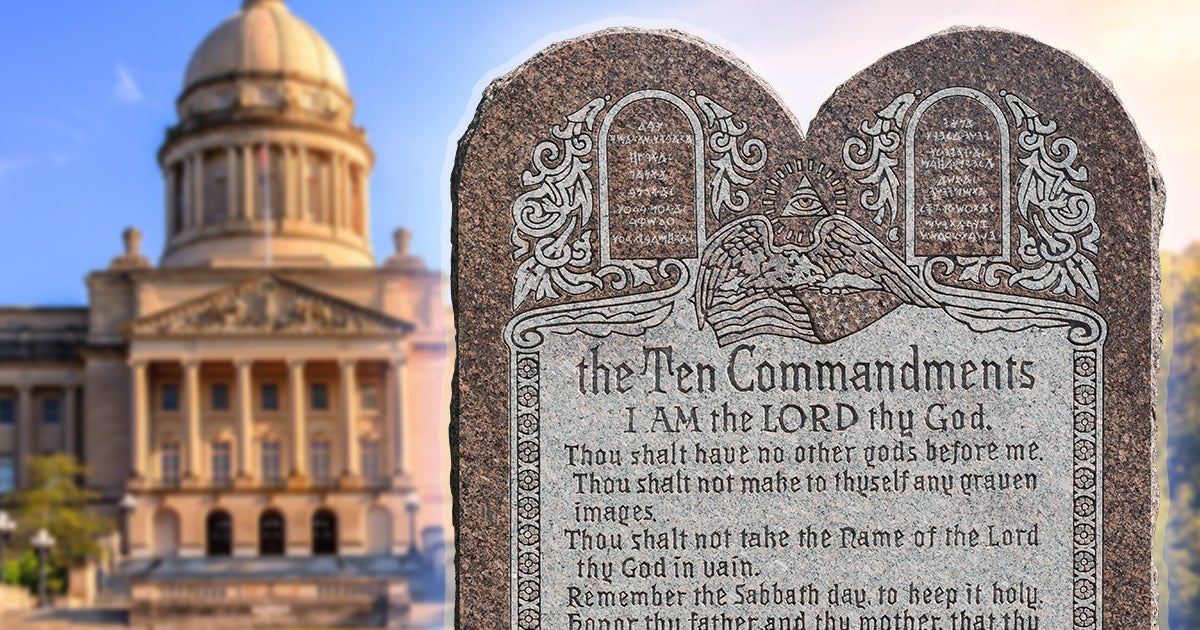
by Jorge Gomez • 4 minutes
Earlier this week, Kentucky House Joint Resolution 15 (HJR 15), which passed the state legislature by an overwhelming majority in both houses, became law. The legislation returns for permanent display a historic Ten Commandments monument to the state Capitol.
The display was originally donated by the Fraternal Order of Eagles in 1971. First Liberty represents Eagles Aerie 3423 in Hopkinsville. The group has maintained the monument for over 20 years and will return it to the state to be placed on the Capitol grounds.
“We applaud the Kentucky Legislature for restoring a part of Kentucky’s history,” said Roger Byron, Senior Counsel for First Liberty. “Like Kentucky’s monument, there is a long history and tradition of public monuments and displays that recognize the unique and important role the Ten Commandments have played in state and national history.”
“We are thrilled to return the Ten Commandments monument to the state and have it restored to the Capitol grounds, its historic location,” said Vic Jeffries, trustee of Eagles Aerie 3423. “The Eagles have donated over 100 Ten Commandments monuments to state and local governments over the years, and we’re glad to have ours back where it belongs.”
The monument stood on the Capitol grounds until the 1980s when it was moved due to a construction project. In 2000, a legislative resolution was signed into law that required it be returned to the Capitol grounds for permanent display near the floral clock. But its return was blocked by a federal appeals court order that relied on the Lemon test, a maligned U.S. Supreme Court precedent that stifled religious freedom for decades.
Thanks to First Liberty’s Supreme Court victories, a seismic change to religious freedom law is taking place.
Lemon was rejected by the Supreme Court in our victory in the Bladensburg Peace Cross case, The American Legion v. American Humanist Association. That ruling mandated a presumptive lawfulness for established symbols, displays and practices.
In Kennedy v. Bremerton School District—another landmark First Liberty victory at the Supreme Court—the Court rejected Lemon entirely and mandated that the Establishment Clause be understood and applied by original meaning, history and tradition.
Religious Expression in the Public Square Embodies the Best of America’s Traditions
Many opponents often argue that restoring the Ten Commandments, In God We Trust or other religious messages to public property is “coercive” or “forcing religion onto others.” But that’s simply not the case.
To be clear, government should not and cannot coerce any citizen toward religion. But it also cannot and should not inhibit religious freedom and expression.
Not every citizen in our country is religious or of the same faith tradition. While we have different beliefs, this does not mean that government can hide the religious parts of our history and heritage. Doing so is discriminatory and runs afoul to what religious liberty is about. Bottom line, it’s a great disservice to our country when government decides to censor public religious displays.
Displaying the Ten Commandments in public spaces such as state capitols benefits everyone because it reminds us of the foundations on which our country is built.
As the Supreme Court has explained, the Ten Commandments “have an undeniable historical meaning,” including “historical significance as one of the foundations of our legal system,” and such “acknowledgments of the role played by the Ten Commandments in our Nation’s heritage are common throughout America.”
Public displays of faith and religion are a part of our history and tradition. They embody the best of America’s ideals and our founding principles.
The Battle for Religious Freedom Isn’t Over
We’re witnessing incredible momentum for religious freedom. Faith and religious expression are being restored in states across America. But the fight for religious liberty is far from over.
Our opponents are relentless and already responding with legal attacks. Many of these groups are incredibly well-funded—and you can be sure their attacks will not stop anytime soon. This is a fight that will only intensify.
The enemies of freedom will likely challenge many of these advances for religious freedom. Many of the positive actions could end up being litigated and tied up in lengthy and tough legal cases. Or there could be courts that strike them down.
We’ve opened up great opportunities to restore faith across America. We are at the beginning of some huge legal battles about the future of our freedoms.
Please give to First Liberty today. Your gift is essential in this fight—it’s the difference maker that will help us win more cases and continue changing the future of our country.